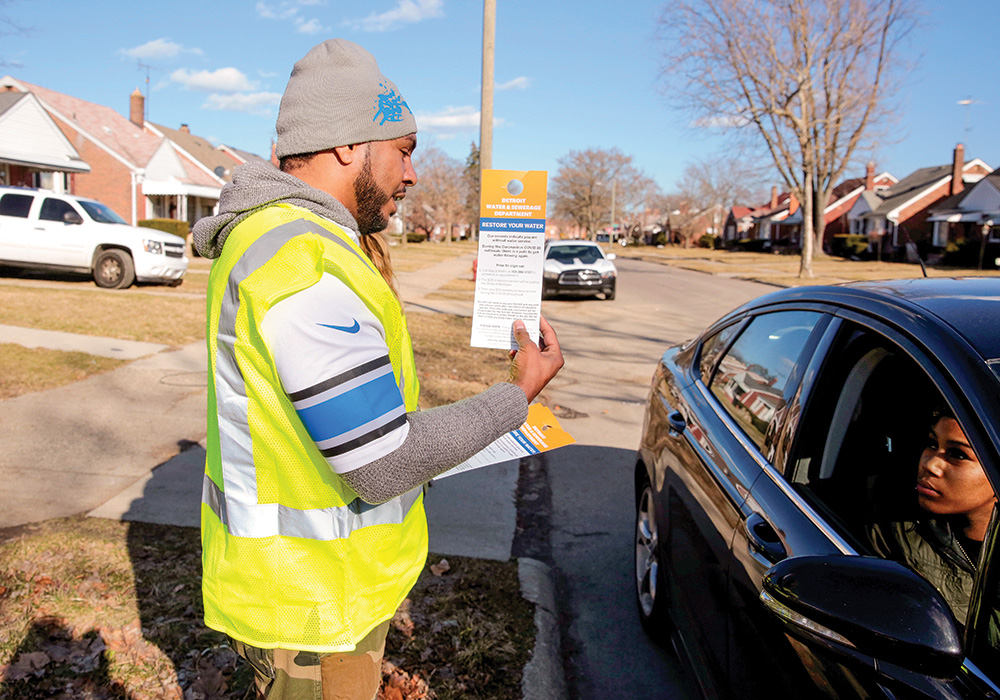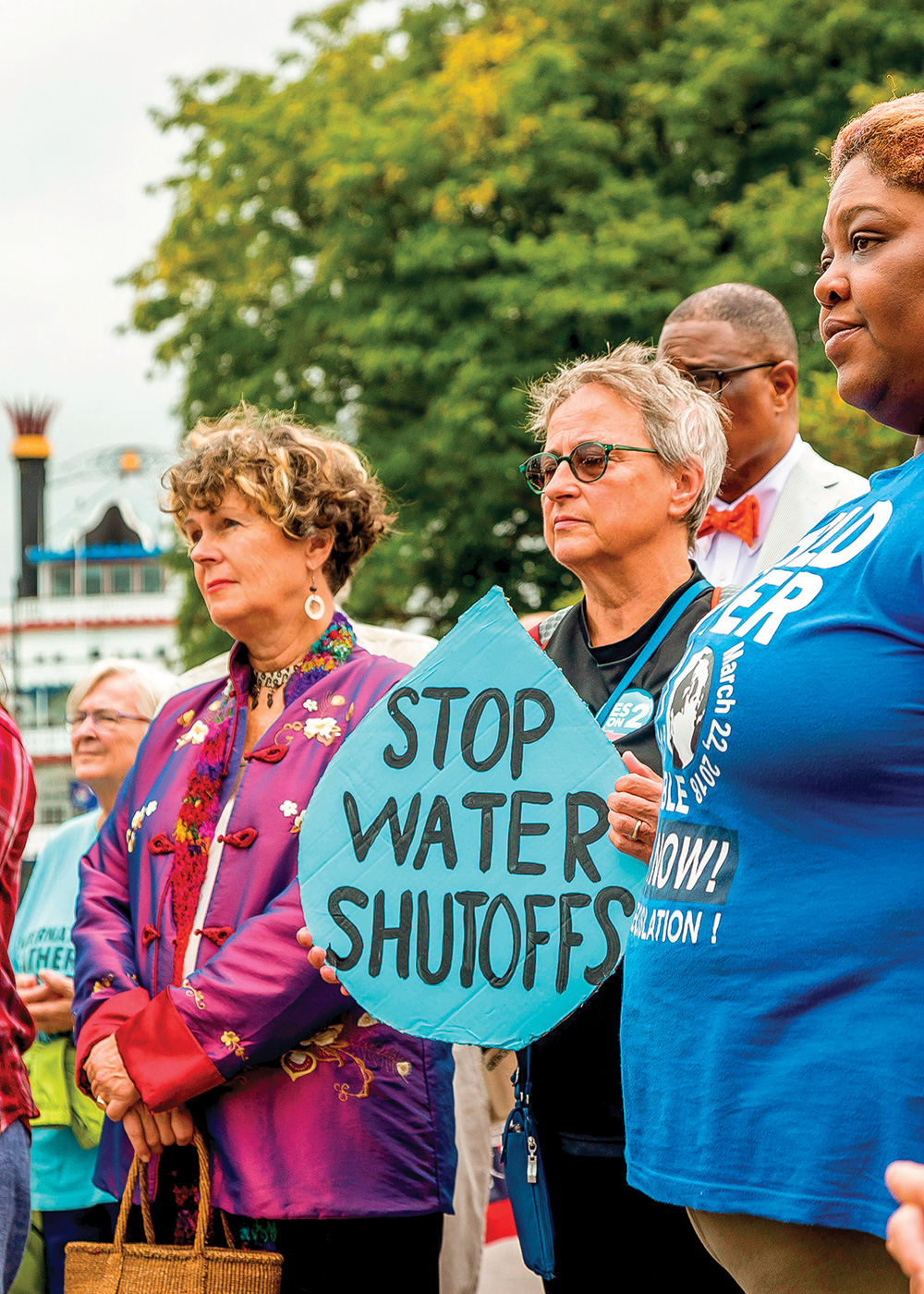Planning May 2020
Equity
Uncharted Waters for Utilities and Public Health
In an unprecedented policy change, service disruptions have been suspended in cities across the U.S. to help fight COVID-19. But for many, water shutoffs were a problem long before the pandemic.

A Detroit Water & Sewerage Department employee gives information to residents about restoring their water service. The city suspended shutoffs as a public health and safety measure during the early days of the COVID-19 outbreak. Photo by Rebecca Cook/Reuters.
By Daniel C. Vock
The novel coronavirus pandemic has led to a remarkable turnaround in policy for Detroit's drinking water utility. After years of shutting off service for unpaid bills, the Detroit Water & Sewerage Department (DWSD) has not only put a halt to those cutoffs, but actively started to reconnect customers.
Michigan Gov. Gretchen Whitmer and Detroit Mayor Mike Duggan announced the plan with DWSD in early March, before any cases of COVID-19 were reported in the state. They characterized it as a preventative measure.
"One of the best ways to combat the spread of this disease is by washing your hands thoroughly," Whitmer said when the plan was announced on March 9. "That's why the state is stepping up to cover the cost of water restoration for the first 30 days, because it's the right thing to do to keep families safe and protect public health."
Similar moratoriums have now spread throughout the country. A week after Detroit's announcement, 113 more water utilities implemented similar plans, according to Food and Water Watch, a national advocacy group. At least seven states — Wisconsin, New York, Connecticut, New Jersey, Pennsylvania, Illinois, and Louisiana — have also banned water shutoffs as of publication. At that time, however, only 20 utilities indicated that they would restore service to previously disconnected customers.
A radical shift
Such widespread policy changes are rare for utilities, says Paul Brown, AICP, a California planner who specializes in the planning and management of water utilities and environmental services. "This is different from an earthquake or even wildfires. Those are so focused in terms of their impacts that you're not inclined to change your whole water policy."
Utilities could handle those types of disasters on a case-by-case basis, he explains, but "this is a rare emergency that actually impacts every single American. It justifies a broad policy change, compared to local ones," Brown says.
The change in policy makes sense and fits with water utilities' missions, he adds. Government officials are telling people to stay home, and that means that a lot of people aren't able to earn money by going to work. Shutting off their water would undermine the public health directives.
"Most utilities are always sensitive to people's ability to pay, and this particular emergency puts a tremendous amount of people out of work. This is not a time when any utility wants to go out and ding people in an emergency," he says.
Financial impacts
Eric Rothstein, a Chicago-based expert in water utility management, says most water utilities are in a good financial position that will allow them to operate without worry, even if they don't conduct any water shutoffs for nonpayment. Water utilities — including those that deliver drinking water, provide sewer systems, or collect stormwater — must routinely prove to investors that they are on solid financial footing because they rely on publicly traded bonds to finance their infrastructure of pipes and treatment plants. Part of what utilities do to prove their worth to investors is to show they can handle a financial emergency like the one caused by the pandemic, he says.

Water access in Detroit has been the subject of advocacy efforts and protests since the city began widespread service shutoffs six years ago due to a historic bankruptcy. Photo by Jim West/Alamy.
"The overarching imperative for water utilities is that they provide public health-needed continuity of service. For the most part, they have the financial resiliency to do so," Rothstein says. "There is absolutely no financial reason that would argue against imposing temporary moratoriums on shutoffs."
But the specific impact of the economic crisis will vary greatly from utility to utility, he cautions. Water utility managers in the U.S. island territory Guam, for example, are worried about what a drop in tourism will mean for demand, while officials in Cincinnati are working to predict the impact of an idled major auto factory.
While the National Association of Clean Water Agencies asked the federal government for $3 billion to cover low-income customers' monthly bills, no emergency aid was dedicated to water utilities in the $2 trillion Coronavirus Aid, Relief, and Economic Security Act.
A chronic crisis
In the first two weeks of Detroit's program, more than 1,400 households qualified for protection. That includes those who had their water restored, those who avoided imminent disconnections, and those whose service was still in the process of being restored. The People's Water Board Coalition, a local activist group, estimated that 9,500 Detroit households lacked access to drinking water in March.
The fact that Detroit was one of the first cities to implement a moratorium on water shutoffs is significant, considering that last year the city disconnected some 23,000 households from water service alone, a continuation of shutoffs that began in earnest during the city's historic bankruptcy in 2014. Six years ago, observers from the United Nations said Detroit's widespread disconnections were "contrary to human rights," especially because they disproportionately affected low-income and Black residents.
Zoë Roller, a senior program manager at the US Water Alliance who studies the effects of water management on vulnerable communities, says COVID-19 has underscored shortcomings in the country's public health infrastructure. Community activists have further highlighted those needs, prompting utilities to respond, including power and telecommunications companies.
But Roller points out that federal financial support for water utilities has declined over recent decades. The federal government provides assistance for people who need help paying for food and electricity, but not for water, she says. Meanwhile, water bills in some places have increased as utilities have tried to cover the cost of maintaining aging infrastructure, complying with new environmental regulations, and coping with decreased usage.
"In the communities that are affected by shutoffs, this has been a crisis for a long time, but now it is being more widely acknowledged as one," she says. "We need to find funding sources to continue to do this, because the need for it is not just when there is an infectious disease."
Daniel C. Vock is a public policy reporter based in Washington, D.C.


